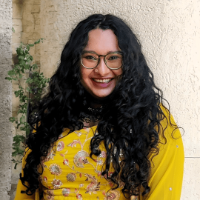Anika Pinto

Email: anika.pinto@bristol.ac.uk
LinkedIn: www.linkedin.com/in/anika-pinto
Project Title: Co-designing a Generative AI Companion for Daily Living Support for Adults with ADHD
Supervisory team: Dr Kenton O'Hara, Dr Paul Marshall, Dr Emily Nielsen
Project summary
My PhD project explores the design and evaluation of a generative AI “companion” to support adults living with ADHD. Many adults with ADHD experience challenges with executive function, attention regulation, and social interaction, which can significantly impact daily life. While there are existing tools and resources, there’s still a considerable gap between what’s available and what people actually need. The aim of my research is to ensure that any technology we develop is grounded in the real, lived experiences of adults with ADHD. That’s why I’m taking a co-design approach; working in partnership with people with ADHD throughout the entire process, not just as participants but as active collaborators.
The project follows a three-stage methodology. It begins with co-design workshops to explore needs, preferences, and everyday challenges. This will be followed by an iterative process of prototyping and developing the companion. Finally, the companion will be deployed “in the wild,” where participants will use it in their daily lives. The goal is not just to build a functional tool, but to create something genuinely supportive, grounded in empathy, and shaped by the people it’s meant to help. Through this process, I hope to contribute new insights into how generative AI can be meaningfully integrated into everyday life as a form of personalised support for neurodivergent communities.
Bio
My academic journey began at St. Xavier's College, Mumbai, where I pursued a BA in Psychology and Economics. Wanting to dive deeper, I continued my journey at King's College London, completing an MSc in Clinical Neurodevelopmental Sciences. These degrees laid the foundation for my interest in human behaviour and ignited a curiosity to delve deeper into research in mental health and well-being.
After my MSc, I joined the School Initiative for Mental Health Advocacy, a field-action project of the Tata Institute of Social Sciences (TISS), Mumbai. In my roles as Research Officer and, later, Research Coordinator, I managed and coordinated various research activities, aiming to transform schools into supportive environments for students’ mental health and well-being. It was during this time I noticed significant gaps in conventional mental health care interventions, which led me to look at the potential of digital technologies in addressing these gaps.
This growing interest in digital approaches to well-being eventually led me to pursue a PhD in Digital Health and Care. I’m particularly interested in how technology can be used to create more accessible, person-centred, and preventive forms of support, especially for populations who are often underserved by traditional systems. My work is shaped by a strong belief in co-design, lived experience, and the idea that innovation should fit into people’s lives, not the other way around.
